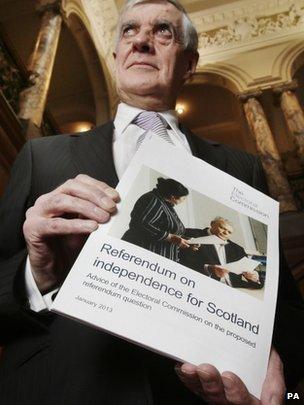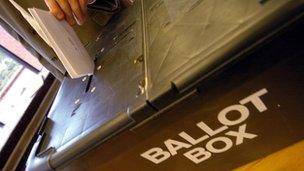Scottish independence: The big questions
- Published

The Electoral Commission's report seems to have found a formula which pleases everyone
Folk want facts. There is a clamour for clarity. There is a demand that I should stop this endless alliteration and write something meaningful.
So here goes. The Electoral Commission are on the ball when they say that people are eager to obtain neutral, dispassionate information about the referendum and its consequences.
So much is evident from the briefest conversation with any of the electorate in Scotland. I sympathise and empathise - although I feel there are constraints which will emerge.
Entirely understandably, people are asking: what will this mean for me, for my family? For my employment, my pay, my pension, my benefits?
In essence, they are asking: what will happen to the economy?
In that realm, we are dependent partly upon statistics - which are malleable, to say the least.
And we are, at least partly, dependent upon trust and belief: what do you presume will happen under a given scenario, given a set of parameters?
Which is scarcely the certainty which people want. But consider. The Chancellor of the Exchequer cannot offer economic certainty either. Nobody can.
But let us narrow this point down a little further.
The Electoral Commission's report, external has been welcomed for an exceptionally deft piece of skill in finding a formula which pleases everyone - or, more precisely, displeases them all so minimally that they are constrained to agree for fear of appearing curmudgeonly.
Purely from the tone deployed, the Nationalist side seems a little happier.
They have got parity of funding - provided there is no rush of distinct, external organisations on the Unionist side which seems unlikely given the pre-existence of an umbrella campaign. (The same reasoning applies, of course, in reverse.)
One senior insider told me they played "hardball" on funding in the hope that they would be granted parity. They have been.
On the question, the Scottish government has been advised to change the wording - and has readily accepted. And I do mean readily. This is no reluctant climbdown. Far from it.
Consider the issues involved. Objection has been raised to the SG question which was, "do you agree that Scotland should be an independent country".
But it is the "do you agree" bit which goes. Not the undiluted mention of an "independent country".
It is now: "Should Scotland be an independent country?" Up with this Nicola Sturgeon can put.
Why the change? The commission's survey experts held focus groups across the country.
They sought advice from participants: political parties and the rest. They received unsolicited suggestions from others.
It was a thorough, scientific exercise. And those involved took it exceptionally seriously.
I love the anecdotes in the report about folk grappling with the question and trying to get it right in the interests of their nation.
For example, a few participants, including some whose first language was other than English, suggested "do you want" instead of the blunter "should" - on the charming grounds that it was more polite.
That level of detailed concern makes one proud.
Some queried "independent" (too upbeat.) Some queried "country" (state, nation?). Some experts, in particular, lodged such queries.
'Less than perturbed'
But, overall, people in Scotland understood perfectly well the concept of an independent country.
They knew it implied ending the existing UK.
Their quibble was that "do you agree" tended to lead folk towards the conclusion that the proposal being put before them was inherently positive.
It sounded, as they put it, as if the questioner was inviting and soliciting support, rather than posing a neutral query.
So that bit goes. I put it to Nicola Sturgeon that her government had been "chastised" over the question. I have to report that she seemed less than perturbed.
But let us remind ourselves that the Unionist side have made considerable progress here - and overall.

David Cameron said there would be no pre-negotiations on the prospect of ending the Union.
They have their big prize - a referendum on a single question. They now have an amended wording, albeit one that the other side likes too.
Funding will revert to a position more in line with previous thinking, including greater scope for external organisations.
However, there is at least one direct challenge to the advocates of Union within the Commission's report. And that brings me back to the point raised at the outset. It is the issue of information.
The commission report puts it rather neatly. Folk may understand what "independent country" means. They get the concept.
But, in this particular case, they do not, they cannot, know what the precise consequences of their decision would be, in terms of process.
They ponder: what happens if I vote Yes? What happens if I vote No?
And they don't want declamatory, political answers couched in apocalyptic language. They want straightforward information.
So today's report suggests there should be discussions between the Scottish and UK governments with a view to producing a composite factsheet which the Commission might then distribute.
Otherwise, they say, people will be offered two competing views - which will simply add to their confusion.
Snag. The UK government is on the record as rejecting such discussions on the grounds that they posit the prospect of a Yes vote.
And their entire strategy is predicated upon presuming that such a vote will not occur.
In the Commons, Prime Minister David Cameron again made this clear. No pre-negotiations on the prospect of ending the Union.
However, he got his caveat in first - to the effect that there would be discussions with the Scottish Government. And that point was also included in a statement from the Scottish Secretary Michael Moore.
So what happens with this? I do not expect that there will now be talks on mutually contentious issues: such as Scotland's relationship with the EU or the defence posture post independence.
However, I do expect that there will now have to be some further contact between the two governments, probably at official level, in order to produce a form of common wording with regards to what follows the referendum.
This might usefully dwell upon such matters as: negotiations post a putative Yes vote leading to a bill ending the Union at Westminster.
Might be rather trickier with regard to the consequences of a No vote - for the very good reason that the parties advocating such a vote do not presently agree with each other on that point. At least in terms of detail.
However, it is not beyond the wit of expert officials in both St Andrews and Dover houses to draft a text which complies with the Electoral Commission's request for an explanation of post ballot process.
In sum? We have yet to witness Royal Assent to the Section 30 order transferring the referendum to Holyrood. We have yet to witness the Holyrood legislation providing for that referendum.
But, in reality, we now know the rules.
We have the question. We have the campaign finance limits. We have the appeal for information. The Electoral Commission can be well satisfied.